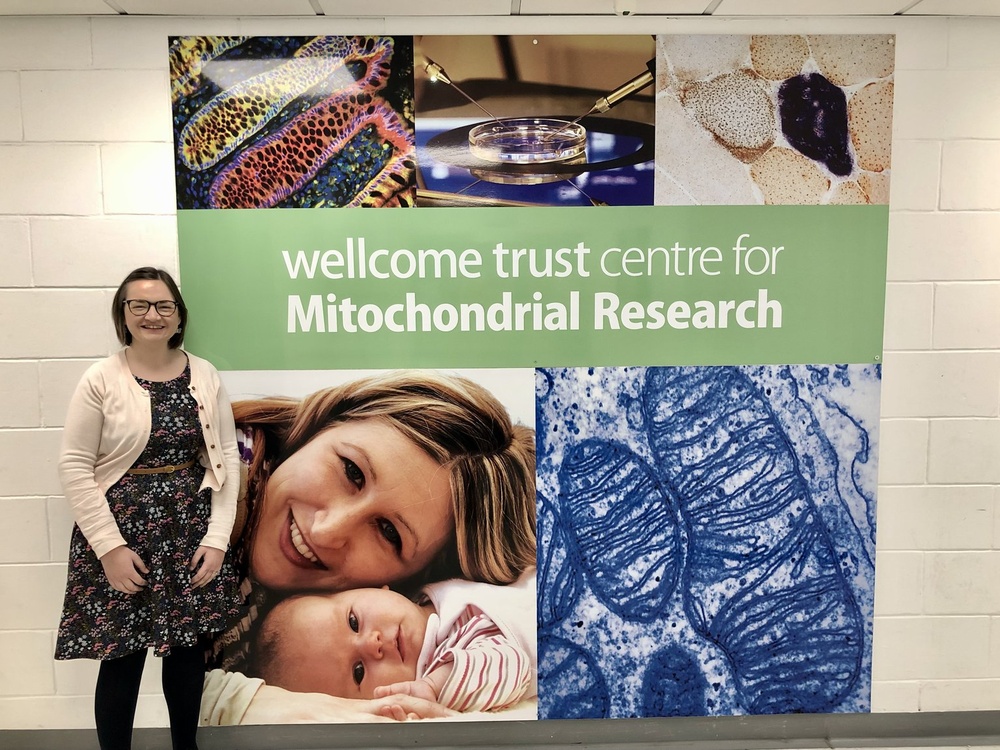I am a registered children’s nurse, and I started my career working on a bone marrow transplant ward for children at the Royal Victoria Infirmary in Newcastle. From very early on in my career I was curious about becoming involved in research as I saw the effect that developments in scientific research had in delivering ground-breaking new treatments to patients.
I became a research nurse in 2016, and spent five years delivering clinical trials to patients with rare neuromuscular diseases. During this time, I had the opportunity to work closely with patients and families, and learned a lot about what being part of research meant for people affected by rare genetic diseases that currently have no cure. I learnt how my role was vital in helping patients and families navigate their journey through research, understanding what was important to them and ensuring that their voices were heard.
Most recently I worked as a Nurse Specialist, delivering clinical care to patients with rare neuromuscular diseases. However, my real passion lay in research, so when the opportunity with The Lily Foundation came up to combine this passion with the opportunity to help patients engage with research, I knew I had to apply. Although this is my first time working with patients with mitochondrial diseases, I was aware of the work of The Lily Foundation both professionally and personally, and I feel very lucky to have been offered a dream role with such an important charity.
Bringing patients, scientists and medical companies together
A large part of my role as Science & Patient Engagement Officer is about ensuring that patients and families are given information about developments in mitochondrial disease in a way that they understand. This involves making sure that our website, published material and all communication of medical terms and scientific concepts are in a format that is understandable, accessible and helpful for the patients and families that we support.
My role also involves making sure that patients and families who are affected by a mitochondrial disease diagnosis have their voices heard, and are involved in research at all stages of development. It is my job to understand the needs and research priorities of patients with mitochondrial disease and help to communicate these needs to scientists, researchers and pharmaceutical companies.
Advocacy, agency and ethics
I feel very strongly that it is absolutely vital that patients and families are involved in research. Although scientists, doctors and researchers have a huge amount of knowledge about mitochondrial disease, they cannot know what it is like to live with a mitochondrial disease and how the symptoms impact everyday life. Involving patients and families in research allows us to understand what life is like from their perspective, and ensures that the research that is ongoing into the condition is relevant, important and will make a real difference to families.
There is also an important moral aspect to consider: the concept of ‘nothing about me, without me’ means that patients have a right to be involved in research that is looking into a condition that they live with every day. It’s also really important to ensure that patients and families understand what the research is setting out to achieve, and to involve patients in the practical aspects of developing a research study. If a study isn’t designed in a way that is practical, manageable, and with the potential to benefit patients, changes may need to be made.
How Lily helps
Something that I love about The Lily Foundation is their effort to ensure that patients and families are kept up to date with the latest updates from researchers. We hold several events, such as Patient Information Days and Family Weekends, with dedicated sessions for clinicians and researchers to give research updates, and we are looking forward to getting these back up and running after the disruption caused by the pandemic.
We are also working hard to ensure that there are lots more opportunities for patients to get involved in medical research, and this will be strengthened with the launch of the Lily Medical Registry, and other planned research projects this year. We will also continue our efforts to link researchers up with patients, for example through focus groups that give patients the chance to have their say about potential research ideas and study design.
Working towards a common goal
I am still quite new to my role, having joined the Lily team at the end of January, however I am really enjoying getting to know the patients and families and beginning to understand how their lives are impacted by mitochondrial disease. I think that the weekly virtual coffee mornings are an amazing opportunity for people living with mito to meet over a cuppa and chat about their lives and experiences. It’s a great source of support for patients to feel like they are not alone, and I am privileged to be able to join the weekly call.
I’ve also already met lots of researchers and clinicians working together to develop new treatments for mitochondrial disorders, and I am blown away by their dedication and passion. I feel so lucky to be able to join such an inspirational team who are all working towards a common goal – to develop effective treatments and, most importantly, a cure for mitochondrial disease.

